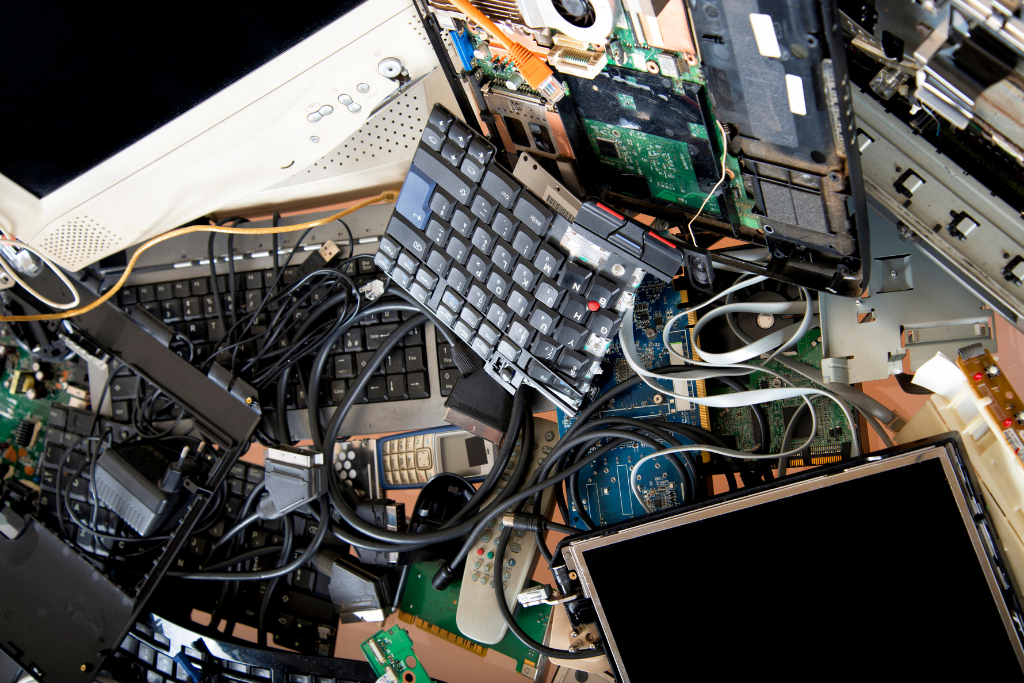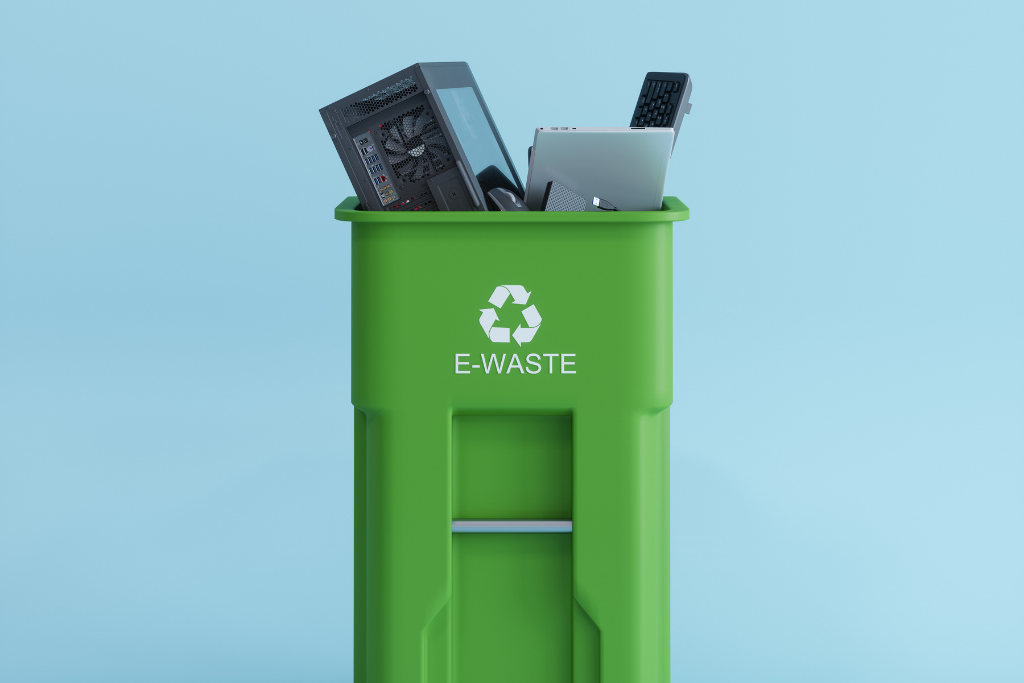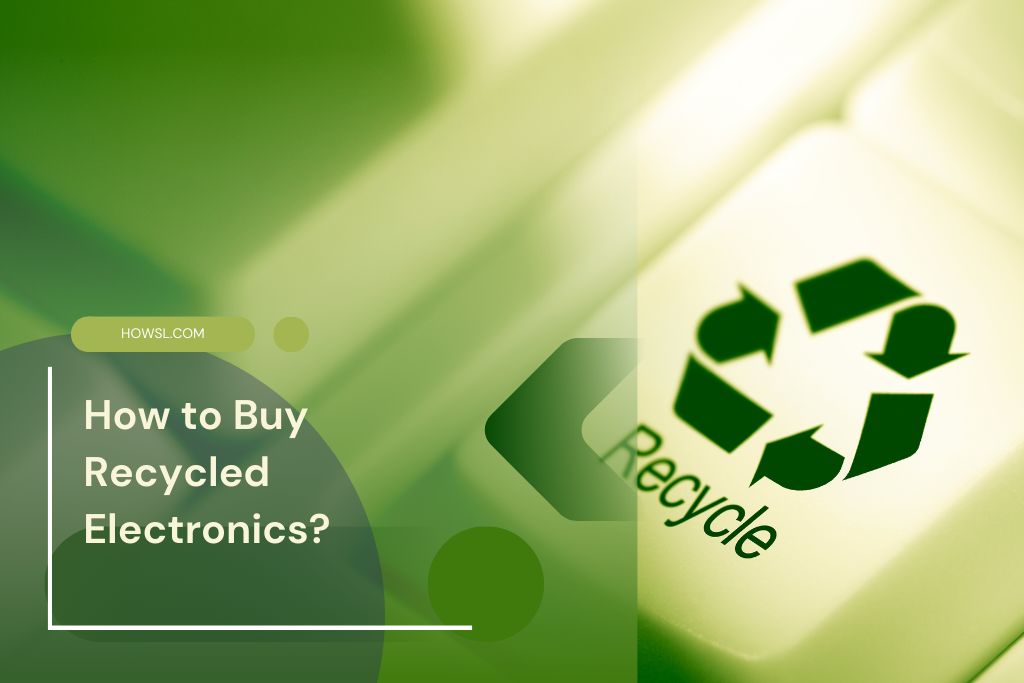Understanding the Importance of Purchasing Recycled Electronics
When it comes to electronic devices, the world has witnessed rapid growth in technological advancements. Consumers are often tempted to replace their old devices with the latest models with each new version and upgrade. However, this consumer behavior has led to a significant increase in electronic waste, also known as e-waste. As an expert in the recycling industry, I can confidently say that purchasing recycled electronics is not just a trend but a responsible choice that brings numerous benefits.
One of the key reasons why purchasing recycled electronics is important is its positive environmental impact. By opting for recycled devices, you reduce the amount of e-waste in landfills. E-waste contains hazardous materials such as lead, mercury, and cadmium, which can contaminate soil and water sources, seriously threatening ecosystems and human health. By choosing recycled electronics, you play an active role in reducing pollution and conserving natural resources. In addition, recycling electronics requires less energy than manufacturing new ones, contributing to energy conservation and mitigating the carbon footprint.
Researching Reliable Sources for Recycled Electronics
When purchasing recycled electronics, it is crucial to research reliable sources that can provide high-quality products. With the increasing demand for sustainable and environmentally friendly options, the market for recycled electronics has expanded. However, not all suppliers meet the necessary quality, functionality, and certification compliance standards.
To ensure that you purchase from a trustworthy source, it is essential to conduct thorough research. Here are some key factors to consider:
Reputation and Expertise
Look for suppliers with a solid reputation and expertise in the field of electronic recycling. Consider their years of experience, certifications, and partnerships with reputable organizations. A supplier with a long-standing reputation is more likely to offer reliable, high-quality recycled electronics.
Product Testing and Inspection
A reputable source for recycled electronics should have rigorous testing and inspection processes to ensure the functionality and reliability of the products they sell. Inquire about their quality control measures, such as testing for performance, durability, and safety standards. Reliable suppliers will be transparent about their testing procedures and provide you with detailed information.
Warranty and Return Policy
Before making a purchase, review the supplier’s warranty and return policy. A reliable source for recycled electronics will typically offer a warranty period and provide clear guidelines on returns or exchanges. This demonstrates their confidence in the quality of their products and their commitment to customer satisfaction.
Customer Reviews and Recommendations
Consider checking customer reviews and recommendations for the supplier you are considering. Online platforms and forums can be valuable resources for gathering insights into other customers’ experiences. Look for positive feedback regarding product quality, customer service, and overall satisfaction. However, be cautious of suspiciously perfect ratings, as they might not accurately reflect real-world experiences.
By investing time and effort into researching reliable sources for recycled electronics, you can ensure that your purchase meets your expectations in terms of quality, functionality, and environmental sustainability. Taking these steps will benefit you and contribute to the larger goal of reducing electronic waste and conserving valuable resources.

Evaluating the Quality and Functionality of Recycled Electronics
Ensuring the quality and functionality of the products is crucial when purchasing recycled electronics. Without proper evaluation, you may end up with devices that do not meet your expectations or fail to perform as desired. Here are some key factors to consider when evaluating the quality and functionality of recycled electronics:
## 1. Physical Condition
Start by examining the physical condition of the device. Look for signs of wear and tear, such as scratches, dents, or cracked screens. While minor cosmetic damage may not affect the functionality, ensuring the device is in good overall condition is important.
## 2. Performance Testing
Next, conduct performance tests on the recycled electronics. Check if the device powers on and off smoothly and if all buttons and features work as intended. Test the device’s connectivity options, such as Wi-Fi and Bluetooth, to ensure they function properly. Additionally, run software tests to ensure the device operates smoothly without glitches.
## 3. Battery Health
For devices that rely on batteries, assessing their health is essential. Check the battery life and see if it matches the specifications provided. Consider the battery’s expected lifespan and determine if a replacement may be required soon.
## 4. Compatibility
Ensuring that the recycled electronic device is compatible with your existing equipment or software is important. Check compatibility requirements and verify if the device meets them. This will help prevent compatibility issues and ensure a seamless integration with your current setup.
## 5. Previous Usage
Where possible, gather information about the previous usage of the recycled electronic device. Knowing factors such as the age of the device, the frequency of use, and the environment in which it was operated can provide insights into its potential lifespan and reliability.
## 6. Warranty and Return Policy
Lastly, inquire about the warranty and return policy of the recycled electronics. A reputable seller should provide a warranty period to cover any unforeseen issues that may arise. Familiarize yourself with the terms and conditions of the warranty and ensure that they align with your needs.
By carefully evaluating the quality and functionality of recycled electronics, you can make an informed decision and ensure that you are investing in reliable devices that meet your requirements.
Verifying the Certification and Compliance of Recycled Electronics
Once you have identified potential suppliers of recycled electronics, it is crucial to verify their certification and compliance. This step ensures that your electronics meet the necessary standards and adhere to environmental regulations. In the recycling industry, certifications such as ISO 14001 and R2 demonstrate a supplier’s commitment to responsibly managing electronic waste.
### Checking for Certifications
When researching suppliers, look for those who proudly display their certifications on their website or product listings. ISO 14001 certification, for example, indicates that the supplier has implemented effective environmental management systems, including proper handling, recycling, and disposal of electronic waste. The Responsible Recycling (R2) certification is another valuable credential that guarantees the supplier’s commitment to ethical and environmentally sound practices in the electronics recycling process.
### Requesting Compliance Documents
In addition to certifications, requesting compliance documents from the supplier is advisable. These documents prove that recycled electronics meet specific regulatory and legal requirements. For instance, the supplier should be able to provide documentation that the electronics have been properly tested and meet safety standards. This ensures that you purchase electronics that have undergone rigorous quality checks and are safe for use or resale.
In the next sections, we will explore other essential aspects of purchasing recycled electronics, including comparing prices, assessing warranty policies, and considering the environmental impact.
Comparing Prices and Cost-effectiveness of Recycled Electronics
One important factor to consider when purchasing recycled electronics is the price and cost-effectiveness. While it may be tempting to choose the cheapest option available, it is crucial to weigh the price against the value and quality of the product.
Evaluating the Price
When comparing prices of recycled electronics, it is essential to look beyond the initial cost. Consider the overall long-term value of the product, including its durability, functionality, and potential for future upgrades. While a lower price may be attractive, ensuring that the product meets your specific needs and is of reliable quality is important.
Assessing the Cost-effectiveness
Cost-effectiveness goes beyond the initial purchase price, considering the long-term savings and benefits that recycled electronics can provide. For example, purchasing a high-quality recycled computer may come with a higher upfront cost, but it could lead to significant energy consumption and maintenance savings over time. Some recycled electronics may also come with warranties or service agreements, providing added value and peace of mind.
By thoroughly evaluating the price and cost-effectiveness of recycled electronics, you can make an informed decision and choose a product that offers the best value for your money. Consider your specific requirements, assess the quality and long-term benefits of the product, and determine whether the price aligns with its overall worth. Only then can you confidently select a recycled electronic device that meets your needs while being mindful of your budget?
Assessing the Warranty and Return Policy for Recycled Electronics
When purchasing recycled electronics, it is essential to assess the warranty and return policy offered by the supplier. While purchasing recycled electronics may be appealing due to its environmental benefits and potential cost savings, it is crucial to ensure that you have recourse if the product does not meet your expectations or encounter issues.
A reliable warranty and return policy gives you the peace of mind that you can return or exchange the product if it arrives damaged or fails to function correctly. Additionally, it serves as an indication of the supplier’s confidence in the quality of their products. By carefully considering the warranty and return policy, you can safeguard your investment and avoid any potential frustrations from purchasing a faulty or unsatisfactory recycled electronic device.
To assess the warranty and return policy effectively, here are some key factors to consider:
### 1. Duration of Warranty:
Check the length of the warranty offered by the supplier. A more extended warranty period typically indicates that the supplier has confidence in the quality of their products and can provide support for a significant period.
### 2. Coverage:
Review what aspects of the product are covered under the warranty. This includes components, parts, and any potential issues that can arise during normal use. Understand the terms and conditions, so you know what is included and excluded from the warranty coverage.
### 3. Return Process:
Familiarize yourself with the return process outlined in the policy. Determine what steps you need to take in case you need to return or exchange the product. Consider factors such as return shipping costs, required documentation, and the timeframe for initiating returns.
### 4. Customer Support:
Evaluate the level of customer support provided by the supplier. Prompt and helpful customer service ensures that your concerns and queries are addressed efficiently, enabling a smoother warranty and return experience.
By carefully scrutinizing the warranty and return policy for recycled electronics, you can make an informed decision and mitigate the potential risks of purchasing pre-owned electronic devices.
Considering the Environmental Impact of Recycled Electronics
The environmental impact of electronic waste has become a pressing concern in recent years. As technology advances rapidly, electronic device lifespans have decreased significantly, leading to a surge in e-waste generation. Properly managing and disposing of this waste is crucial for the well-being of our planet.
When considering the environmental impact of recycled electronics, it is essential to look beyond the immediate benefits of reusing materials. While recycling can help conserve valuable resources and reduce the need for raw materials extraction, it is equally important to ensure that the recycling process is carried out in an environmentally responsible manner.
## The Importance of Responsible Recycling Practices
Responsible recycling practices involve proper dismantling and disposal of electronic devices, ensuring that hazardous materials are handled safely and that valuable components are recovered efficiently. By purchasing recycled electronics from suppliers who follow these practices, you can contribute to reducing the overall environmental impact of e-waste.
Recyclers who adhere to strict environmental standards minimize the release of toxic substances into the environment and promote energy savings through efficient recycling processes. Additionally, they play a vital role in diverting electronic waste from landfills and reducing the demand for new products, thus conserving valuable resources.
In the following sections, we will explore the key factors to consider when evaluating the environmental impact of recycled electronics. From the certification and compliance of recycling facilities to the overall carbon footprint associated with the recycling process, understanding these factors will empower you to make well-informed decisions that align with your sustainability goals.
Checking the Compatibility and Connectivity of Recycled Electronics
When purchasing recycled electronics, checking for compatibility and connectivity is crucial to ensure the devices work seamlessly with your existing setup. This step will save you from potential frustration and the need for additional adapters or accessories. Here are some key considerations to keep in mind:
1. Device compatibility: Before purchasing, determine whether the recycled electronic device is compatible with your operating system, software, and hardware requirements. For example, if you are buying a recycled computer or laptop, ensure that it supports the latest version of your preferred operating system. Many devices may have specific compatibility requirements, especially for specialized software or peripherals.
2. Connectivity options: Look into the connectivity options of the recycled electronics you are interested in. Consider the ports available, such as USB, HDMI, Ethernet, or audio jacks, and ensure they meet your needs. For instance, if you plan to connect multiple peripherals or external devices, ensure the device has enough USB ports or the necessary connectivity options for seamless integration.
3. Wireless capabilities: Check if the recycled device has built-in Wi-Fi or Bluetooth capabilities if you require wireless connectivity. This is particularly important for devices like laptops, tablets, or smartphones, where wireless connectivity is often necessary. Having these features pre-installed can save you the hassle of purchasing and installing external wireless adapters.
4. Third-party compatibility: If you rely on specific third-party devices or accessories, verify if they are compatible with the recycled electronics you are considering. Some devices may have proprietary connectors or features that require additional compatibility checks. It is always wise to consult the manufacturer’s specifications or contact customer support for detailed information.
Taking the time to assess the compatibility and connectivity of recycled electronics thoroughly will help you make an informed decision and avoid potential compatibility issues. By ensuring that the devices work seamlessly with your existing setup, you can maximize their utility and enjoy a hassle-free experience.
Seeking Recommendations and Reviews for Recycled Electronics Suppliers
When purchasing recycled electronics, gathering recommendations and reading reviews is crucial to ensure you’re choosing a reliable supplier. With numerous options available in the market, it can be overwhelming to decide without any guidance. Seeking recommendations and reviews from trusted sources can help you narrow your choices and make an informed decision.
### Word of Mouth Recommendations
Word-of-mouth recommendations are one of the best ways to find a reputable supplier. Talk to friends, family, colleagues, or other professionals who have previously purchased recycled electronics. Their personal experiences and insights can give you valuable information about the reliability and quality of different suppliers. Additionally, you can seek recommendations from online communities, forums, or social media groups dedicated to recycling or sustainable technologies. These platforms often provide a wealth of knowledge and firsthand experiences from individuals who have dealt with various suppliers.
Making an Informed Decision When Purchasing Recycled Electronics
**Making an Informed Decision When Purchasing Recycled Electronics**
As the demand for sustainable and eco-friendly solutions grows, more individuals and businesses are turning to recycled electronics as an alternative to buying new ones. However, making an informed decision when purchasing recycled electronics is crucial to ensure a reliable and functional product that meets your needs. This section will explore some essential factors to consider when purchasing.
**Researching the Supplier and Product**
Before making a purchase, you must research the supplier and the specific product you are interested in. Look for suppliers with a track record of reliability and credibility in the recycling industry. Check if they have appropriate certifications and compliance with environmental regulations. Also, pay attention to their customer reviews and ratings to understand their reputation and customer satisfaction. When it comes to the product itself, find out about its history, including its refurbishment process and any repairs or upgrades that have been made. This information will help you assess the quality and functionality of the recycled electronics you are considering.

Why is it important to purchase recycled electronics?
Purchasing recycled electronics helps reduce electronic waste and its harmful environmental impact. It also promotes a circular economy by extending the lifespan of electronic devices.
How can I research reliable sources for recycled electronics?
Look for reputable sellers, certified refurbishers, and authorized retailers. Check online customer reviews and ratings to gauge their credibility.
How do I evaluate the quality and functionality of recycled electronics?
Inspect the device’s physical condition, test its functionality, and inquire about any previous repairs or refurbishments. Ask for warranties or guarantees to ensure the quality.
How can I verify the certification and compliance of recycled electronics?
Look for certifications such as R2 or e-Stewards, which ensure responsible recycling and handling of electronic waste. Ask the seller for documentation or proof of compliance.
How can I compare the prices and cost-effectiveness of recycled electronics?
Compare prices from different sellers to ensure you’re getting a fair deal. Consider the device’s specifications, condition, and any additional accessories or services included in the price.
What should I consider regarding the warranty and return policy for recycled electronics?
Check the warranty coverage and duration offered by the seller. Understand the return policy in case the device doesn’t meet your expectations or if any issues arise.
How should I consider the environmental impact of recycled electronics?
Look for sellers who prioritize sustainability and eco-friendly practices. Consider the device’s energy efficiency, recycling programs, and the use of environmentally friendly materials.
What factors should I check regarding the compatibility and connectivity of recycled electronics?
Verify if the device is compatible with your existing setup, such as operating systems, software, and peripherals. Ensure it has the necessary connectivity options (e.g., ports, Wi-Fi, Bluetooth) for your needs.
How can I find recommendations and reviews for recycled electronics suppliers?
Seek recommendations from friends, colleagues, or online communities specializing in electronics. Look for reviews on websites, social media platforms, or industry forums.
How can I make an informed decision when purchasing recycled electronics?
Consider all the above factors, including the device’s quality, certifications, pricing, warranty, environmental impact, compatibility, recommendations, and reviews. Analyze this information to make a well-informed decision that meets your needs and preferences.
